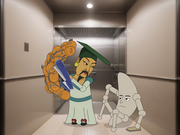Pinyin final: "e4"
The Pinyin final "e4" is used in the second half of Pinyin syllables. In MandarinBanana's mnemonic system, the second half of a Pinyin syllable is always represented by a location. You can visit the Pinyin index to see all Pinyin syllables from this mnemonic group, or to see all Pinyin syllables "e4" can appear in.
Mnemonics for e4
Characters with e4
to compose a poem in reply (to sb's poem) using the same rhyme sequence / to join in the singing / to chime in with others
plants sprouting
I don't know but somehow I have to think of a thornbush when looking at this character. Maybe because it looks so spiky. To make things interesting let's say this represents a burning thornbush talking to people. The burning thornbush talks to Charlie Chaplin (ch) in the elevator's bathroom (e4) and tells him what to do, but Charlie won't listen.
each / every
各
=
口
+
夂
:
Mnemonic symbol: each and every (各) one of us is made of atoms, of which most were created in a star (from lighter atoms). That's why I choose to represent this character by a star. Guy Fawkes (g) is stepping on a mandarin (口) with high heels (夂) in the bathroom of the elevator (e4). As he squeezes, the mandarin suddenly explodes in a rain of stars (各). Each and every (各) one of them is shining brighter than the others.
(classifier used before a noun that has no specific classifier) / (bound form) individual
to amputate one or both feet (punishment in imperial China) (one of the five mutilating punishments 五刑[wu3 xing2])
(pronoun) this; these / (bound form) this; the (followed by a noun) / (bound form) this; these (followed by a classifier) (in this sense, commonly pr. [zhei4], esp. in Beijing)
sick / sickness / Kang Xi radical 104 / also pr. [chuang2]
to shoot / to launch / to allude to / radio- (chemistry)
射
=
寸
+
身
:
Sherlock Holmes (sh) is ready for takeoff in the elevator's bathroom (e4) and stands in front of a rocket on a launch pad (mnemonic symbol for 射). As there are many journalists, Sherlock prepared to be extra fancy and wears a tight body suit (身). He winks to the photographers and makes the thumbs up (寸) sign.
to thank / to apologize / to wither (of flowers, leaves etc) / to decline
谢
=
射
+
讠
:
Marie Curie (xi) just came back from her trip to outer space and is standing in front of the launch pad (射) in the elevator's bathroom (e4). She thanks (谢) her sponsors and points towards the sponsors' advertising column (讠), saying that it would have been impossible to go to outer space without their funding.
surname Xie
谢
=
射
+
讠
:
Marie Curie (xi) just came back from her trip to outer space and is standing in front of the launch pad (射) in the elevator's bathroom (e4). She thanks (谢) her sponsors and points towards the sponsors' advertising column (讠), saying that it would have been impossible to go to outer space without their funding.


